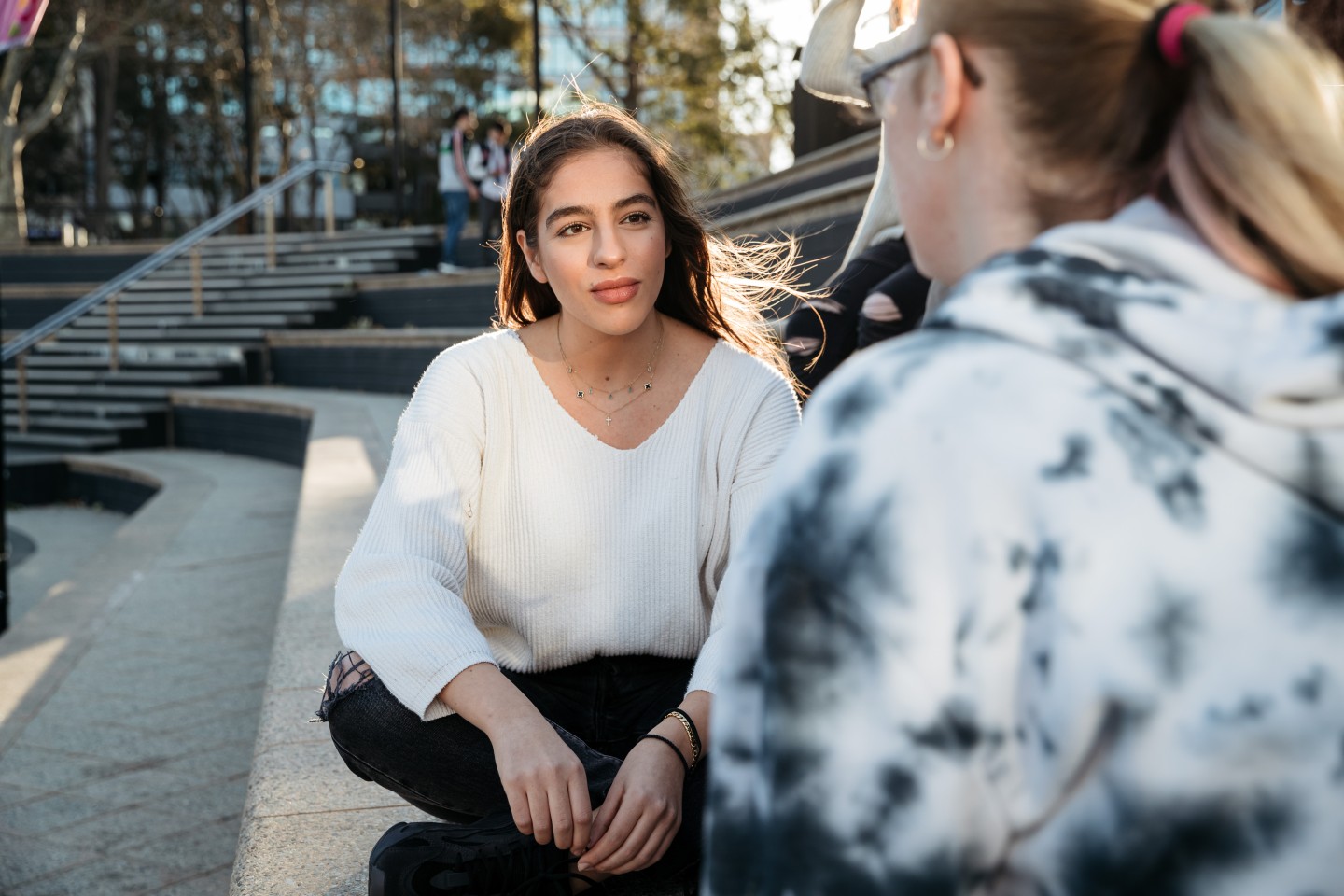Opening up about what you're feeling, however you choose to do that can sometimes feel like a lot. This can be harder if it’s something that's super important to you, or if you think might be difficult for the other person to hear. It can also be a massive step towards lightening your emotional load, making sense of what’s weighing you down, and bringing you closer to the people that matter to you. And guess what? You don’t have to figure it all out alone. Let’s break it down and make communicating feelings a little easier.
Sharing how we feel with other people in our lives can help form and maintain healthy relationships. We might choose to share feelings to feel supported, to help others understand our needs, to work through challenges together, or simply to connect on a deeper level. What we share and how we express it often depends on who we’re talking to and the context we’re in. Feelings you share with a friend, for example, may be different to feelings you share with a colleague or boss. For lots of people, families, cultures and communities, sharing feelings and emotions might not always be done with words- it could be shown through actions, body language, art, or other indirect ways of expressing care or meaning.
1. First things first: What are you feeling, anyway?
Before we jump to the talking bit it’s a good idea to check in with ourselves. Sometimes our emotions are loud, like excitement or anger. Other times, they’re quiet and hard to describe. Here’s how to start untangling them:
-
Check in with your body. Tight chest? Butterflies? Headache? Your body might be sending signals your brain hasn’t caught up with yet. Noticing where in your body you might be holding stress and tension can help us decode what we are feeling
-
Name it to tame it. Are you feeling anxious? Lonely? Confused? Exhausted? There’s no wrong answer but getting curious and giving it a name can help to ground us and make it easier to talk about when we feel ready to
-
Write it out. Dumping your thoughts and feelings out on a piece of paper or into a note on your phone can help us gain some perspective. If you’re not sure where to begin start small or just write a few words. If it helps you could draft it as a letter or a message to yourself or someone else (we won’t send this one so you can feel free to be totally unfiltered)
-
Be kind to yourself. Especially if you’ve been through something big or carrying these feelings for a while, emotions can feel really intense. Be gentle with yourself
Pro tip: Essentially, be aware of your body, try to name and write your feelings out, and be kind to yourself. You don't need to 'fix' the feeling- just noticing it is powerful.
2. Find the right time and place
You have some feelings you’re ready to share with someone. Picking a time and place where they can be given the attention they deserve might give you the best chances of getting on the same page and feeling heard:
-
Pick your moment. When you and the other person are not super stressed, tired, or busy
-
Choose your space. Somewhere chill and private where you both feel comfy (Walk-and-talk? Your room? A park bench? Car chat? Quiet cafe?)
-
Online or offline? Sometimes talking face-to-face helps as emotions can get lost between screens, but if texting feels like the best way for you, that’s okay too. Just try to be clear and kind. Any way you share is good as long as you and the other person feel comfortable and your message is heard. Sometimes it's helpful to kickstart a difficult conversation over text or email and then take it offline
-
Think about who feels safe. Start with someone safe. You may want to practise the chat with someone you trust or know well before you share with others you are not so comfortable with
Pro tip: There might not be a perfect time and place to open up but picking a moment and a place where you can both feel safe and calm can make it easier to open up and be heard.
3. How to say what you feel (without it getting too awkward)
Okay, so you’ve got something to say. Try these tips:
-
Start with. “I feel…” – Like, “I feel hurt when…”, “I felt frustrated about...” rather than ‘you’ statements like “you never listen”, “you always do this!”.
-
Lead with what you want. It can help to start the conversation with your hopes for where it will lead like "I want to feel more seen and understood”, “I care about us and I want to feel closer", "Something has been weighing me down that I want help to hold."
-
Be real, not perfect. It’s okay if it comes out messy. Feelings don’t need a script. If you start to feel overwhelmed take a few deep breaths and feel the ground beneath your feet to help to keep you in the moment
-
Set your boundaries. Share only what feels safe. It’s okay to say, “This is hard to talk about,” or “I don’t want to go into detail.”
-
Circle back. Take the pressure off. Not everything needs to be said all at once. If you or the person need to take a break and come back to it that’s fine (in fact it can help to have time to reflect on what each other have shared). You could say something like, "Can we take a break and finish this later?"
-
If it doesn’t go the way you’d hoped. sometimes you can pour your heart into saying something that matters to you, and the other person just doesn’t hear it in the way you hoped. It doesn’t mean your voice doesn’t matter– it just means you might need to try again at a different time, try a different way, or find someone else who might listen. In the meantime, be gentle with yourself, you did a brave thing and it’s normal to feel vulnerable after opening up, especially if it didn’t go so well. Take time to look after yourself and connect with others that you do feel supported by
Pro tip: Not ready to talk? That’s totally okay. Maybe try putting what you want to say into a letter, email, or text to share with them. It totally counts and it might help to get the conversation going.
4. What about the other person?
Talking is one thing—but listening matters too. Giving the other person the space to respond to what you have said and share their own experience is important. It’s what makes it a real conversation and not one sided. If someone opens up to you:
-
Tune in. Sharing can feel vulnerable. Giving the person sharing your full attention and really listening might sound simple but it goes a long way towards helping them feel heard and respected
-
No need to fix it. Sometimes a “That sounds really tough, I’m here for you” is all someone needs. Try not to interrupt or jump straight into advice giving. You might even check in with them by asking “Do you want me to just listen or do you also want to hear ideas I might have?"
-
Acknowledge their perspective. We don’t always see eye to eye with everyone on everything. You can validate the other person’s feelings even if you don’t agree with them
-
Respect their story. Sharing feelings and stories takes grit. If they’re sharing something big you might acknowledge their courage to open up by saying something like “That took guts to share, thank you for trusting me with it”
-
Give each other time. Sometimes after sharing and listening to each other you or the person you have been connecting with might need time to digest what's been shared before responding. It’s okay to give big conversations some breathing space and circle back when you both feel ready
Pro tip: Communication and connection is a two-way street, and being a good listener makes a big difference.
5. Remember, seeking extra support is okay
Whether you’re feeling under the weather, totally lost, or everything all at once—your emotions are real and important. Talking about them isn’t always easy, but it can make life feel a whole lot lighter.
You’re not alone in this and if you ever feel like you need more support help is available.
-
Reach out to someone you trust. Maybe your parent, teacher, school counsellor, elder, coach, or older sibling could help
-
headspace has your back. We offer free, confidential support for young people aged 12–25. Find your nearest centre Find a centre - Australia wide | headspace
-
eheadspace. Talk to a mental health professional from the comfort of your couch Connect with a mental health clinician 1-on-1 | headspace
Pro tip: You don’t have to wait until things feel overwhelming to get help. If there’s room for things to feel lighter and easier that’s a great reason to reach out and seek support. What you feel matters.
A final thought...
Sometimes after sharing feelings, especially if the conversation didn’t go the way you’d hoped, you might feel a kind of emotional wobble. Maybe a mix of unease, doubt, or tenderness. This is a really human response to showing up honestly. It means that you did a brave thing and you cared enough to invite someone in. Be gentle with yourself. Give it time, check in with someone you trust and try to ground yourself in the courage it took to open up. Connection is messy sometimes but that doesn’t make it less meaningful and being open with our feelings is a risk worth taking.
Getting support
If you are feeling unsafe or overwhelmed you can contact
-
Kids Helpline – 1800 55 1800
The headspace Content Reference Group oversee and approve resources made available on this website.
Last reviewed 21 October 2025.
Rogers SL, Howieson J, Neame C. I understand you feel that way, but I feel this way: the benefits of I-language and communicating perspective during conflict. PeerJ. 2018 May 18;6:e4831. doi: 10.7717/peerj.4831. PMID: 29796350; PMCID: PMC5961625.
Get professional support
If you feel you need help there are a range of ways we can support you.


